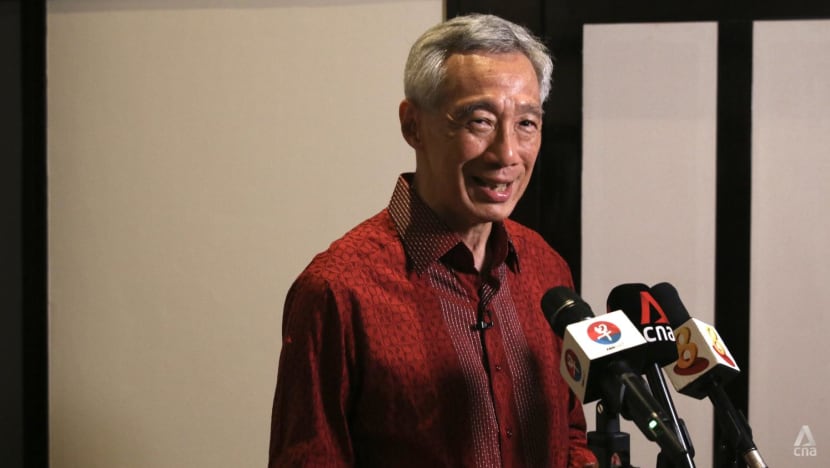Flight Information Region Agreement with Indonesia will ensure civil aviation safety, allow Changi to grow: PM Lee

Prime Minister Lee Hsien Loong speaking to reporters at the end of the 5th Singapore-Indonesia Leaders’ Retreat in Bintan on Jan 25, 2022. (Photo: Aqil Haziq Mahmud)
BINTAN: The Flight Information Region (FIR) Agreement between Singapore and Indonesia will ensure that air traffic control services are provided safely, while allowing Changi Airport to grow in the long term as an international air hub, Prime Minister Lee Hsien Loong said on Tuesday (Jan 25).
Speaking to reporters after the conclusion of the 5th Singapore-Indonesia Leaders’ Retreat in Bintan, he noted that the FIR Agreement realigns the FIR boundaries to be “generally in accordance” with Indonesia's territorial boundaries.
“But secondly, it makes sure that Changi (Airport) is able to operate efficiently, safely and fully, and provide air traffic control services in order to function as an important international airport, and to be able to grow in the long term as an international airport,” he said.
Earlier in the day, Mr Lee and Indonesian President Joko Widodo witnessed the signing of agreements covering FIR, extradition and defence cooperation.
Under the FIR Agreement, Singapore and Indonesia have agreed to realign the boundary between the Jakarta FIR and the Singapore FIR, said a statement issued by Singapore’s Ministry of Foreign Affairs (MFA) on Tuesday.
Indonesia will delegate to Singapore the provision of air navigation services in portions of the airspace within the realigned Jakarta FIR. This Agreement will remain in force for 25 years and shall be extended by mutual consent if both parties find it beneficial to do so, according to the statement.
“The FIR Agreement takes into account International Civil Aviation Organization (ICAO) rules and regulations and will be submitted for approval to the ICAO in accordance with an agreed procedure.”
Indonesia has repeatedly expressed its wish to take over control of the FIR above Riau islands, which has been managed by Singapore since 1946 as mandated by ICAO.
Singapore has repeatedly said that the FIR is not an issue of sovereignty, but of the safety and efficiency of commercial air traffic.
Singapore's Transport Minister S Iswaran said in a Facebook post on Tuesday that the FIR agreement is mutually beneficial and will meet current and future needs of Changi Airport and Indonesian airports.
"It will ensure the safe and efficient growth of civil aviation in the region," he wrote.
"I look forward to the ratification and implementation of the agreement, which will allow Singapore and Indonesia to work even more closely together to uphold the safety and efficiency of international civil aviation."
EXTRADITION AND DEFENCE COOPERATION
Under the Extradition Treaty, Singapore and Indonesia will grant extradition for a comprehensive list of extraditable offences covered by the treaty, in accordance with the laws of both countries and subject to the requisite safeguards and provisions in the treaty, according to the MFA statement.
Meanwhile, the Defence Cooperation Agreement will strengthen the strategic relationship between both defence establishments, and the Singapore Armed Forces (SAF) and Indonesian National Armed Forces, by enhancing cooperation and promoting closer interaction between both armed forces, said the MFA statement.
Related:
“As part of the Defence Cooperation Agreement, the SAF will continue to conduct military training and exercises in training areas in Indonesia, with full respect for Indonesia’s sovereignty over its territory, including its archipelagic and territorial waters and its airspace, and in accordance with the United Nations Convention on the Law of the Sea (UNCLOS).” The Defence Cooperation Agreement and its implementing arrangement shall remain in force for 25 years.
Singapore and Indonesia had signed an Extradition Treaty and Defence Cooperation Agreement as a package in April 2007, witnessed by Mr Lee and then-president of Indonesia Susilo Bambang Yudhoyono.
However, both agreements have yet to be ratified by Indonesia’s House of Representatives.
“So today, we have committed them again, (with) some minor adjustments to the extradition treaty,” Mr Lee said on Tuesday.
During a joint press conference with Mr Lee earlier in the day, Mr Widodo said the revised extradition treaty will extend retroactive application from 15 years to 18 years, in accordance with Article 78 of the Indonesian criminal code.
The next step for both countries would be to implement and ratify the agreements.
AGREEMENTS PROVIDE “LONG-TERM RESOLUTION”
Mr Lee said the set of agreements will provide a “long-term resolution of issues” which are important to both countries.
These issues, if not properly resolved, can cause a lot of trouble to the bilateral relationship, he noted.
“But if they are settled properly, and we have a clear understanding on that, then you can go forward and do a lot more cooperation across the board,” he added.
“So, it's a carefully negotiated and balanced set of agreements. And I think both sides, important interests and concerns have been met.”
According to the MFA statement, both leaders agreed that the agreements represented an “important milestone” for bilateral relations.
“Once ratified and simultaneously brought into force, they would pave the way for stronger and deeper bilateral cooperation, particularly in the areas of civil aviation, defence, and criminal matters,” the statement said.
“Prime Minister Lee and President Joko Widodo agreed that the resolution of these longstanding matters also put both countries in good stead to further deepen engagement in mutual areas of priority.”

















